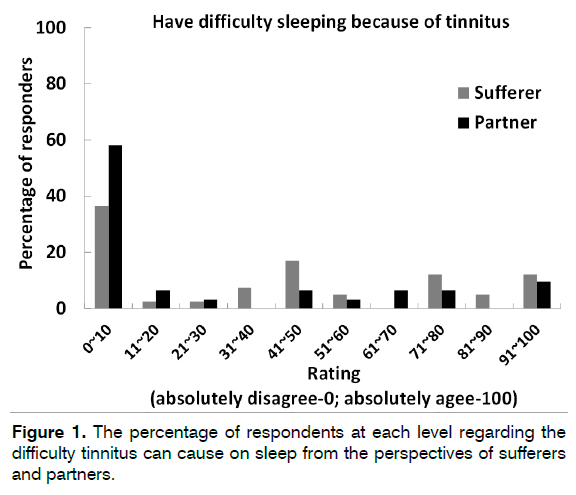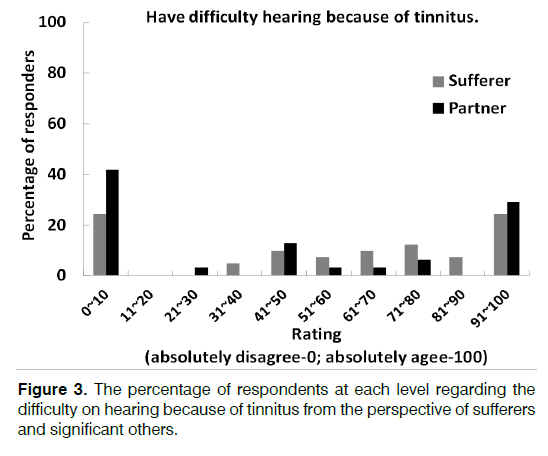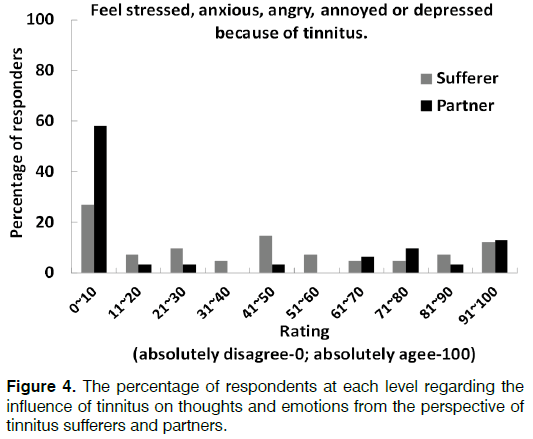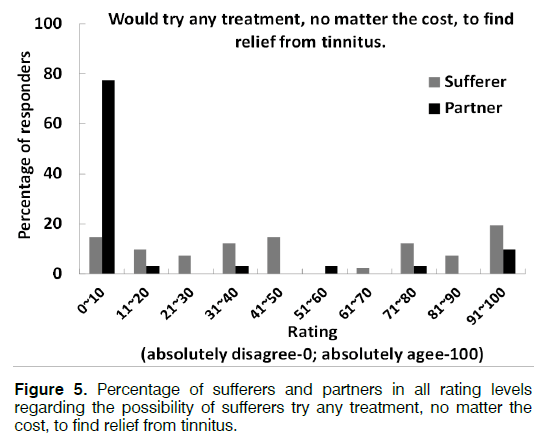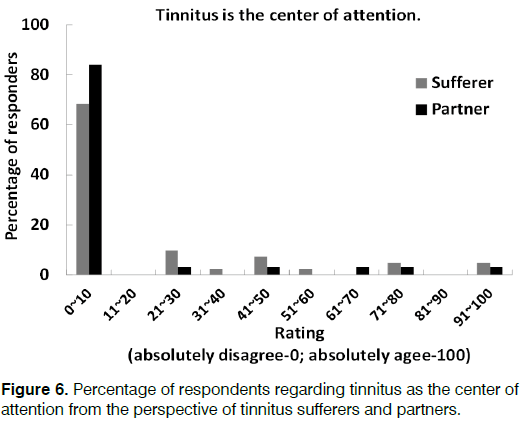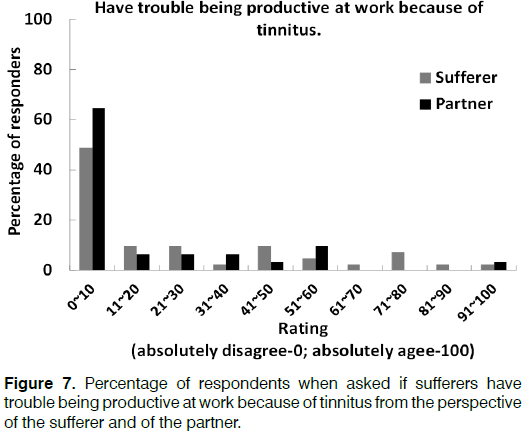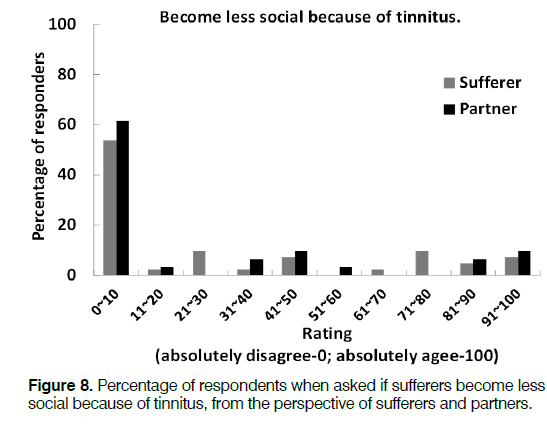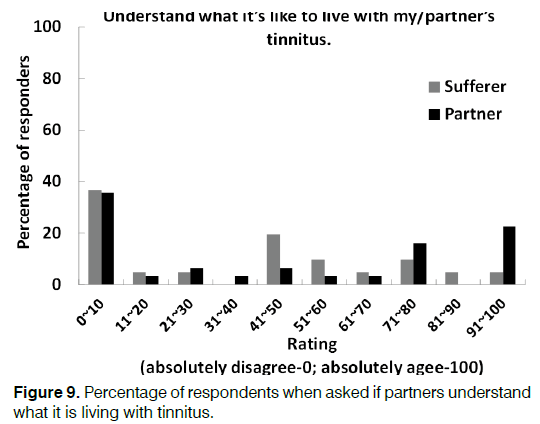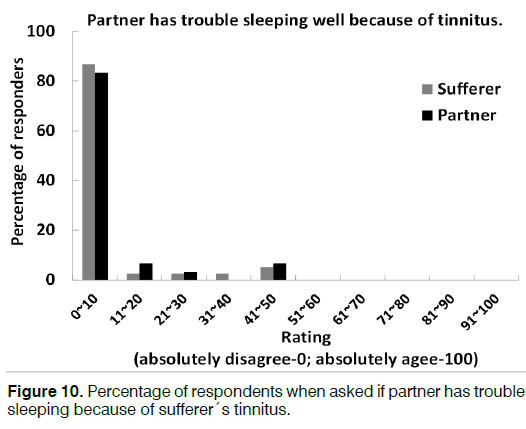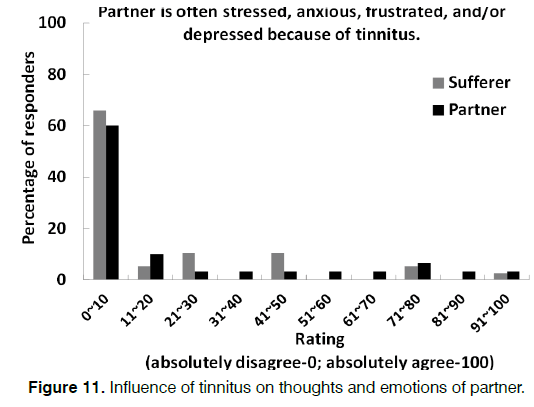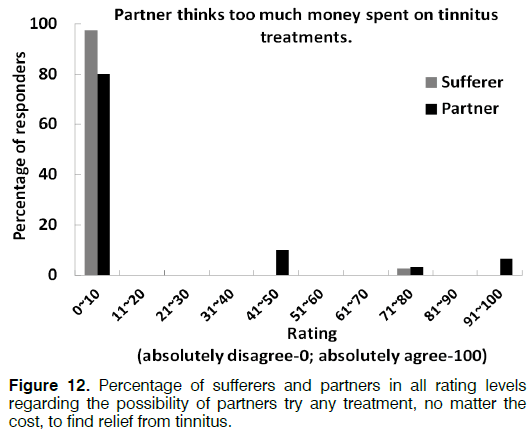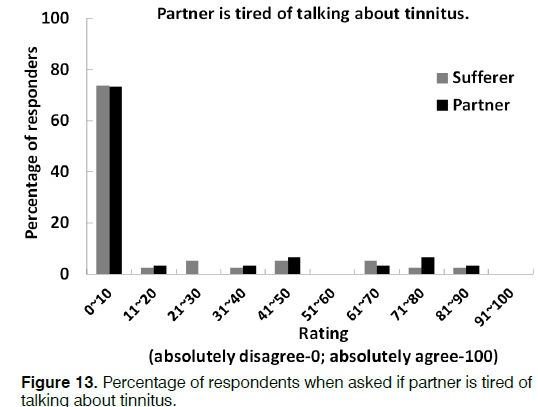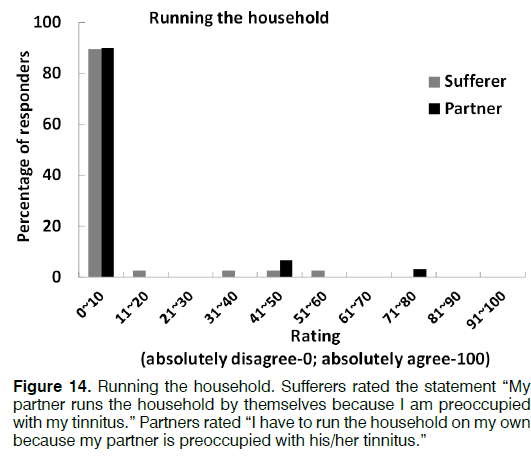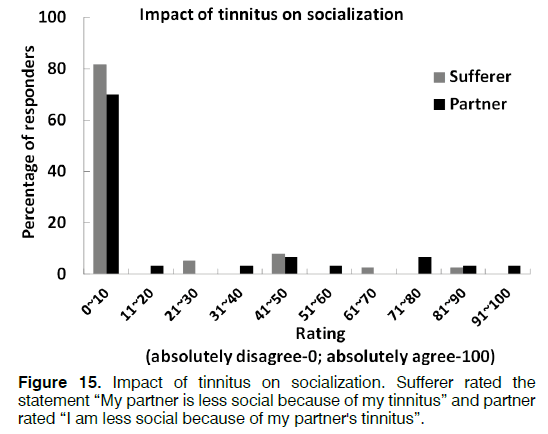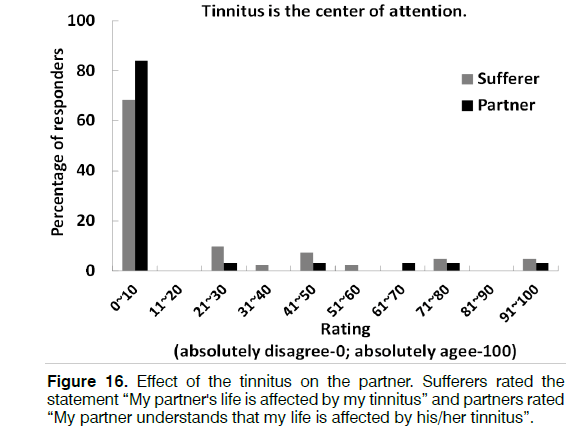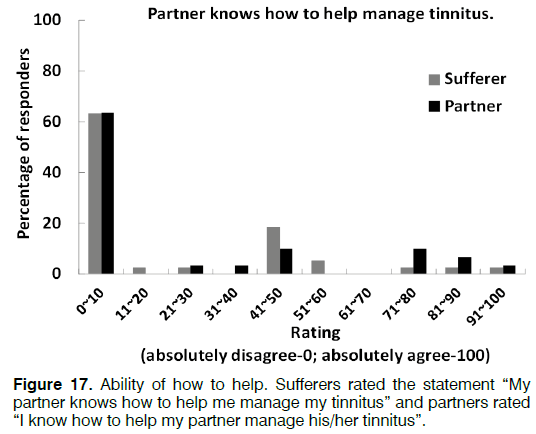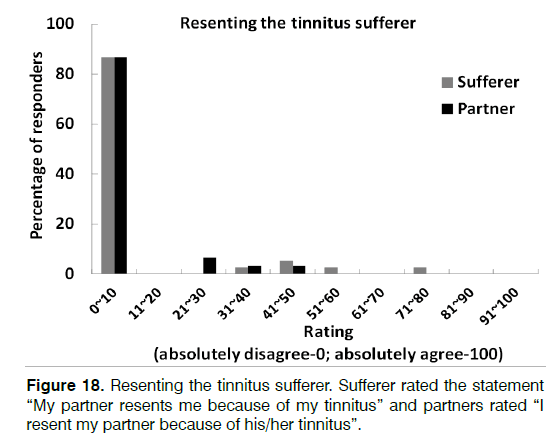The International Tinnitus Journal
Official Journal of the Neurootological and Equilibriometric Society
Official Journal of the Brazil Federal District Otorhinolaryngologist Society
ISSN: 0946-5448

Google scholar citation report
Citations : 12717
The International Tinnitus Journal received 12717 citations as per google scholar report
The International Tinnitus Journal peer review process verified at publons
Indexed In
- Excerpta Medica
- Scimago
- SCOPUS
- Publons
- EMBASE
- Google Scholar
- Euro Pub
- CAS Source Index (CASSI)
- Index Medicus
- Medline
- PubMed
- UGC
- EBSCO
Volume 22, Issue 2 / December 2018
Original Paper Pages:113-122
10.5935/0946-5448.20180020
Considerations for Partners of Our Tinnitus Patients
Authors: Patricia C. Mancini, Richard S. Tyler, Ann Perreau, Lisa F. Batterton, Helena Ji
PDF
Abstract
Tinnitus is an invisible condition, and therefore, it is difficult for those without tinnitus to understand its devastating nature. In this study, we compared the perceptions of tinnitus and related symptoms from tinnitus sufferers and their significant others, in an attempt to improve our counseling to those with tinnitus.
An invitation was emailed to 230 adult sufferers on a tinnitus research registry at the University of Iowa. The tinnitus sufferers and their significant others completed an online survey consisting of statements that addressed how tinnitus affects their lives and open-ended questions that focused on how the significant others could be supportive.
Here we report the results of the 41 tinnitus sufferers (17.8%) who answered the survey and 31 significant others. Tinnitus sufferers reported problems regarding sleep, concentration, hearing, and thoughts and emotions. These difficulties were not always appreciated by their partners. Half of their partners (50%) asserted that their lives were affected by the tinnitus of sufferers, and this was not fully appreciated by sufferers. Tinnitus sufferers and partners agreed that significant others were not able to help with tinnitus. Open-ended questions showed that partners and sufferers wished that significant others understood more about tinnitus and its consequences. Significant others do not always appreciate the difficulties experienced by our tinnitus sufferers. We suggest that partners participate in counseling provided to tinnitus sufferers as part of the treatment plan.
Keywords: tinnitus, spouses, counseling
Keywords
tinnitus, spouses, counseling.
Introduction
Tinnitus is a bothersome condition that causes significant distress for approximately 5%-10% of the population [1,2]. There are numerous studies investigating the effects of tinnitus on the sufferer. These effects include sleep disturbance, difficulty hearing, concentration problems, and altered thoughts and emotions (e.g. fear of having a more serious health condition, stress, anxiety, depression, isolation) [3-9]. As tinnitus can affect the sufferer in so many domains, there seems little doubt that it also has an impact on the patient´s spouse or significant other, with whom sufferers have a close personal relationship. However, few studies have examined the impact of tinnitus on partners and on this relationship.
Pugh et al. examined how spouse responses and marital satisfaction affect the experience of tinnitus [10]. Their findings showed that punishing spousal responses (i.e., ignoring or selectively punishing complaints) were directly and positively related to anxiety and depression in the sufferer, while global levels of marital satisfaction were found to be negatively associated with anxiety and depression [10]. Therefore, we can assume that some types of communication between partners and sufferers can contribute to the level of emotional distress experienced by the patient.
Holgers et al. found that those tinnitus sufferers most likely to suffer from severe tinnitus had anxiety and/or depression [8]. Severe tinnitus was defined in their study as tinnitus that caused frequent visits to the clinic during the 18 months of the study or that caused the sufferers to take time off of work due to the tinnitus. For those who are bothered by their tinnitus, it can affect their thoughts and emotions, hearing, sleep, and concentration [8,9].
Those tinnitus sufferers with greater sleep disturbance due to the tinnitus have greater tinnitus severity ratings, regardless of perceived tinnitus loudness [4]. Folmer and Griest found that sleep disturbance is a major problem for many people with tinnitus and that greater sleep disturbance was correlated with higher percentage of sufferers whose tinnitus began within two years of their initial appointment [6]. Lasisi and Gureje found that Nigerian adults who were 65 years and older with tinnitus experienced insomnia significantly more often than those without tinnitus [11]. They also reported that the adults with tinnitus experienced a significant deterioration in total quality of life scores and the physical, psychological, social, and environmental quality of life domains among elderly adults who had tinnitus with insomnia compared with those elderly who had tinnitus without insomnia [11]. When one partner is unable to sleep, if they toss and turn and get up several times, this could affect the sleep of other. Sullivan et al. found that tinnitus sufferers reported more severe problems with sleep, cognitive difficulties, sexual difficulties, social activities, contact with family and friends, marital difficulty, and illness focusing than those sufferers without tinnitus [5]. These problems were even worse in tinnitus sufferers that were depressed. In this study, tinnitus sufferers were found to have more severe problems with medications, cognitive function, physical appearance, body deterioration, activities of daily living, assertion, and eating in addition to the problems experienced by the non-depressed sufferers [5].
Tinnitus sufferers often experience anxiety and depression due to several different thoughts that are provoked by the tinnitus [9]. Many sufferers fear that the tinnitus is a sign of a more serious condition. A common fear is that the patient will suddenly lose all of their hearing due to the tinnitus, or that they have a tumor or some other life-threatening condition. These thoughts and fears can lead to anxiety and depression [5].
Tinnitus sufferers often experience anxiety, depression, difficulty socializing, difficulty with mood changes, difficulty sleeping, impairment of basic daily activities, and reduced quality of life [3,12]. Sleep difficulties and other negative effects of tinnitus can be the most disturbing during the first two years after onset. Onset can occur at any point in a person’s life. It is likely that tinnitus that will cause difficulties with sleep, concentration, thoughts and emotions, and hearing after they have a significant other in their lives, typically a spouse. These negative effects can cause sufferers to miss work, and may impact their significant other’s life. In some cases, the effects of tinnitus could be so severe, that the tinnitus patient no longer takes on their usual tasks and responsibilities in the house hold and their significant other takes on the task of taking care of their spouse with tinnitus as well as all of the household responsibilities.
There have been a few studies suggesting that tinnitus can impact the family [3,13-16]. Interestingly, there is research looking at the experiences of caregivers of other chronic diseases. Sales described some multidimensional burdens of family caregivers for different chronic diseases such as mental illness, dementia, and cancer [17]. These multidimensional burdens include the direct care needs of the patient, the disruption of normal household routines and roles, financial concerns due to medical costs, income loss, and emotional stress caused by the illness. Sales also stated that cognitive and affective impairments that change the patient’s behavior are more difficult for family members than physical impairments [17]. Sleep disruptions, anxiety, and depression associated with tinnitus affect the patient’s behavior.
Zarit et al. interviewed older adults with senile dementia and their caregivers. Lack of time for oneself, the excessive dependency of the patient on the caregiver, and the caregiver’s fears about further deterioration in the patient’s behavior were commonly mentioned during the interviews [18]. However, they found that the patient’s behavior did not have a significant impact on the level of caregiver burden [18]. The amount of visits from other family members that were not the primary caregiver was significantly related to caregiver burden. Caregivers felt fewer burdens with more frequent visits from other family members. Significant others of sufferers with tinnitus may need to make an effort to keep social networks healthy if their spouse is severely affected by their tinnitus in order to reduce some of their feelings of burden [18].
Gaugler et al. found that caregivers of cancer sufferers who felt overloaded, had financial strains and reported tension with other family members were more likely to have depressive symptoms and a negative health impact from caregiving. Psychosocial resources, such as social networks, and a feeling of mastery of care responsibilities had less negative health impacts from cancer care. Social networks that could be available to provide guidance and support were suggested to prevent negative impacts of cancer caregiving such as loneness, isolation and other depressive symptoms. Caregivers who felt trapped in their role suffered more negative consequences. Those caregivers that had optimism and confidence in their roles were much less likely to experience negative health consequences [19].
It would be expected that people living with individuals with tinnitus also might face some challenges. Some severely-affected tinnitus sufferers miss work due to their tinnitus and likely do not complete household tasks as they did before the tinnitus, increasing household burden on their significant other. Many tinnitus sufferers will spend large amounts of money to try to get rid of the tinnitus [20], which could add financial distress. For those sufferers who are severely depressed and/or anxious, the emotional stress can be a burden for any relationship. And when the cause is unclear, and cannot be seen or appreciated by the partners, this could add to the distress of both partners.
We conducted an online survey to compare the perceptions of tinnitus from sufferers and their significant others. This preliminary study was designed with the expectation that we could evaluate the ways that significant others can be included in counseling for the patient with tinnitus.
Methodology
An invitation was emailed to 230 individuals on a tinnitus research registry at The University of Iowa. The tinnitus registry consists of people that register themselves to participate in tinnitus research. The email asked the individual to complete an online survey by following a link. They were informed that the participation was voluntary and, if they wish, their partner could also participate in the study. In this case, participants with tinnitus provided their partner’s email, and a message containing a link to the survey was sent to the partner. The survey in its entirety took 10-20 minutes to be completed (see Appendix, that illustrates the surveys for sufferers and their significant others).
The survey to tinnitus sufferers consisted of statements that addressed how tinnitus affected their everyday life activities. The statements were to be rated on a scale of 0 to 100 (0=absolutely disagree; 100=absolutely agree). Participants were also asked to respond to questions based on how their significant other’s life would also be affected by tinnitus. Six open-ended questions were included in the survey to obtain more specific feedback from the tinnitus sufferers regarding their experiences, and what they think partners could do to help them manage tinnitus better.
Similarly, the survey to significant others was intended to gauge their understanding of tinnitus and how they might be able to help. They were asked to rate statements on how tinnitus affects the sufferer and their own. They also answered open-ended questions about how they can be more helpful with tinnitus.
Results
Forty-one tinnitus sufferers and 31 significant others followed the link provided and 17.8% of the sample completed the survey. We compared the responses between tinnitus sufferers and their significant others.
The impact of tinnitus on the sufferers
Tinnitus sufferers and their partners rated several statements based on their problems and their understanding of the others’ problems. Figure 1 shows ratings of difficulty with sleep for sufferers and partners. In general, it appears that the understanding of partners on the severity of the sleeping problems is similar with that of sufferers. However, the average low rating (0-10 difficulty) for the sufferers experiencing a minor sleep problem is 37% for the sufferer and 58% for the partner. Therefore, there are some instances where the partner does not fully appreciate the sleep problems experienced by the sufferer.
Figure 2 focuses on concentration problems. Partners and sufferers have overall a similar understanding of concentration problems faced by sufferers. Half of partners (48%) note sufferers experiencing minor concentration problems, while only 29% of sufferers rate this difficulty as minor (0-10). Sufferers might experience concentration problems (ratings>51%-60%), and partners do not have the same understanding on this difficulty.
The difficulty on hearing because of tinnitus from the perspective of sufferers and significant others is shown in Figure 3. We note that difficulty hearing is a major problem perceived by sufferers and partners. Only 24 % and 42% of sufferers and partners, respectively, rated hearing difficulty as a minor problem (0-10). It is noteworthy that some partners do not fully appreciate the hearing difficulties that many tinnitus sufferers have.
Figure 4 represents the ratings regarding the influence of tinnitus on thoughts and emotions. Almost 60% of partners do not notice how tinnitus can interfere and make sufferers feel stressed, anxious, angry, annoyed or depressed. However, 32% of partners rated ≥ 61%, showing that they seem to acknowledge these emotions to tinnitus, as observed on the percentage of partners on higher ratings when compared to that of sufferers.
Figure 5 shows the ratings of sufferers and partners regarding the willingness of sufferers to try new treatments, no matter the cost, to find relief from tinnitus. This figure indicates that 15% of sufferers do not think they can try any treatment for tinnitus, while almost 77% of significant others rated this possibility the same way (0%-10%). These results show that tinnitus sufferers seem willing to try any treatment for tinnitus, no matter the cost, but partners do not appreciate this position.
Tinnitus as the center of attention from the perspective of sufferers and partners is explored on Figure 6. In general, it seems that tinnitus is not the center of attention for most sufferers (68%) and partners (84%). A similar result was found on having trouble being productive at work for the sufferer (Figure 7). Half of tinnitus sufferers (49%) did not believe they had trouble being productive at work. Most partners (65%) shared the same perspective.
Figure 8 shows the results when asked if sufferers become less social because of tinnitus. In general, it seems that this is not a common problem for both sufferers and partners. We note also that 24% of sufferers and 19% of partners rated this problem as 51% or higher.
Figure 9 represents the responses when asked if partners understand what it is living with tinnitus. The results showed that 37% of sufferers and 35% of partners do not think partners know what it is like to live with sufferer´s tinnitus. It was also observed on the ratings of 71%-80% and 91%-100% that partners believe they understand what it is like to live with their partner’s tinnitus, but sufferers do not seem to share the same perspective.
The impact of tinnitus on the partners
Some questions were intended to gauge understanding on how the partner’s life is affected by the tinnitus. Sufferers rated the statements based on how they believe tinnitus affects their partner’s life, and partners answered the statements under the perspective on how tinnitus of sufferer indeed affects their lives.
Figure 10 shows the understanding of the difficulty sleeping by the partner. If the tinnitus sufferer is having difficulty sleeping (e.g. tossing and turning in bed, or getting up several times), it is reasonable that this would affect the partner. In general, it appears that most of the partners sleeping patterns are not affected, and this perspective is generally shared by the sufferer.
Figure 11 represents the percentage of respondents feeling that partner is stressed, anxious, frustrated, or depressed because of sufferer´s tinnitus. In general, it seems that most partners (60%) and sufferers (66%) believe tinnitus has a minor impact on partner’s thoughts and emotions.
Figure 12 shows the results in all rating levels when participants were asked if partners think that too much money was spent on tinnitus treatments. It seems that for the great majority of tinnitus sufferers (97%) and partners (80%), this is not a major problem.
Figure 13 represents the ratings of sufferers and partners when asked if their significant others are tired of talking about tinnitus. In general, for most sufferers and partners tinnitus is not the main center of attention of their conversation.
Figure 14 represents the percentage of sufferers and partners in all rating levels when asked if partner has to run the household because sufferer is preoccupied with tinnitus. Both tinnitus sufferers (89%) and partners (90%) do not feel tinnitus brought a major change on the household due to tinnitus (ratings of 0%-10%). Similarly, tinnitus sufferers and partners seem to share the same perspective that tinnitus does not bring problem to their social lives, as seen in Figure 15.
Figure 16 shows the results when asked if tinnitus affects their significant other’s lives. Approximately 55% of sufferers do not feel their partner’s life is affected by tinnitus (rated 0%-10%). However, when partners rated the statement “My partner understands that my life is affected by his/her tinnitus”, 50% of partners do believe that their lives are affected by sufferer´s tinnitus. Therefore, many partners have their lives affected by the tinnitus of sufferers, but this is not always appreciated by the sufferer.
Figure 17 shows the perception of the ability of how to help the tinnitus sufferers. Many sufferers and partners (63%) are in agreement that the partners are not able to help (ratings of 0%-10%). It should also be noted on the ratings ≥ 71% that there are many partners (20%) that do believe that they are able to help, but fewer sufferers (9%) believe this.
Figure 18 shows the responses when asked if there is resentment associated with tinnitus. The results showed that 87% of sufferers and partners do not experience this resentment because of tinnitus.
Open-ended questions
Sufferers and their partners were asked to answer several open-ended questions to gauge their understanding on what they find to be helpful in managing the tinnitus.
When sufferers were asked “What they wished their partners understood about their tinnitus?” three respondents indicated that they would like their spouse to know what their tinnitus actually sounds like. Five responses indicated that they wish their partners understood that tinnitus is the reason for their difficulty with hearing and concentrating. Seven sufferers mentioned that they wished their partners could understand their distress due to the loss of silence because of the constant tinnitus.
Sufferers were also asked “What their partner could do to help them manage their tinnitus better.” Eleven responses ranged from providing emotional support (e.g., “listen when I talk”) to helping the individual with tinnitus hear better (e.g., “talk louder- no mumbling”, “face me when speaking” and “be there when quiet people talk to help translate”).
Sufferers were asked to “List ways that their partner could help them sleep better”. One of the responses indicated that the sufferer and their partner sleep in separate rooms due to the tinnitus. Another response indicated that the partner helped the sufferer to relax prior to going to bed (“Expressed warmth with soothing head massage”). Two responses mention that background noise at night helps them sleep; therefore indicating that if the partner would accept background noise at night that would help the sufferer sleep better.
When sufferers were asked to describe how their partner could help them hear better, fourteen respondents indicated that the partner could speak louder, tolerate louder listening volumes, face the sufferer when speaking, or not get frustrated when trying to communicate in background noise. They were also asked to “List the things their partner could do to help them concentrate better”. The responses indicate that the partner can pay attention to the sufferer, leave the sufferer alone, get the sufferer’s attention before talking, be understanding of how disruptive background noise is, be aware that living with tinnitus makes the sufferer tired and may further impede listening and talking.
Sufferers were asked to “List things that their partner could do to help them with their thoughts and emotions about tinnitus”. The responses indicate that if the partner is supportive, a good listener, takes the tinnitus seriously, and goes to doctor´s appointments with them it would help.
Partners were asked to “List things they wish they understood about the sufferer’s tinnitus”, and responses indicated that they wish to understand why the tinnitus will never go away, why there is no cure, and what causes the tinnitus. One partner indicated that they wish they understood why the sufferer fears the worst and why they can’t be more helpful.
Partners were asked to “List things that the sufferers could do to help them manage the tinnitus”. Responses included letting the partner know when they are not speaking clearly, telling the partner how the sufferer is doing each day, and adding people to the sufferer’s support group to provide the partner downtime.
The partners were also asked to “List what they need the sufferer to tell them about how tinnitus affects their sleep”. One of the responses indicated that the partners would like to know how to help the sufferer with sleep. Another response indicated that the partner would like to know why the sufferer feels there is too much noise keeping her awake, no matter how quiet the room is.
Partners were asked to “List the things that they need the sufferer to tell them about how tinnitus affects their hearing”. The responses indicated that the partners need to know when the sufferer has difficulty hearing the partner, and what to do to be understood.
The partners were asked to “List the things they need to know about how the tinnitus affects the sufferer’s thoughts and emotions”. The responses indicate that the partners need to know whether what the partner is doing is helping or not. One partner indicated that they need to know that their efforts and support are appreciated.
Discussion
The purpose of this research was to investigate the effects of tinnitus on sufferers and their significant others in an attempt to uncover differences in their knowledge about tinnitus, how they manage this symptom, and what partners can do to help. There were some general agreements between the ratings given by partners and sufferers on the consequences of tinnitus. However, there were also several issues that showed a lack of appreciation of the others problems. For significant others and sufferers, tinnitus was not considered their center of attention to 70% of the sample, did not make the sufferer less social to 60%, did not bring a major change to the household to 90%, and also did not cause resentment in their relationship to 90% of the sample. This was not the case for all, however. Around 60% of sufferers and significant others were also in agreement that partners were usually not very helpful. Sufferers and partners´ ratings differed on many statements. Difficulties experienced by sufferers with sleep, hearing, concentration, and thoughts and emotions were not fully appreciated by the partners.
Our study showed that sufferers and partners often understood that tinnitus can cause sleeping trouble. Additionally, partners´ sleep was generally not affected by the tinnitus of the sufferer. However, partners showed incomplete understanding that their significant others with tinnitus might experience sleeping problems. Sleep disturbances have been reported as a common problem experienced by tinnitus sufferers [3,21-23]. These disturbances include difficulty falling asleep, early awakening, or being tired during the day. Therefore, we conclude that information should be provided to partners and sufferers in regard to the factors that can affect sleep. There are many strategies provided by Tinnitus Activities Treatment (TAT) to help improve sufferers´ patterns of sleep [23]. These strategies include rearranging the bedroom, avoiding taking naps during the day, using background sound, and using relaxation exercises [9,23]. Having support from significant others on some changes to routine and lifestyle can minimize misunderstandings and enhance the mutual feelings of well-being.
Difficulty with hearing was a major problem perceived by sufferers and partners. Individuals with tinnitus noted that their partners could help them manage their tinnitus better if the partner could speak louder, tolerate louder volumes, face the sufferer when speaking, and not get frustrated when trying to communicate with background noise. Tinnitus is almost always accompanied by hearing loss [12,24,25]. As reported by Tyler et al. many sufferers who experience both tinnitus and hearing loss blame their hearing difficulties on tinnitus, even if they have significant hearing loss [23]. Therefore, it is crucial that tinnitus sufferers and their partners receive information on the difficulties in hearing caused by hearing loss and by tinnitus. TAT provides an excellent approach on this topic, in which it is explained to sufferers that even if the tinnitus were taken away, the hearing loss would still be there [9,23]. Additionally, some strategies to improve hearing are provided in order to (1) alleviate some of the communication difficulties that can be associated with hearing loss, (2) reduce communication difficulties associated with tinnitus, and (3) ease stress that can be associated with communication [9,23].
In our research, concentration problems faced by sufferers were also not fully appreciated by their partners. Sufferers´ responses to open-ended questions when asked to list the things their partners could do to help them concentrate better showed that the partners could pay attention to the sufferer, give the sufferer some time alone, get the sufferer’s attention before talking, and be understanding of how disruptive background noise is. This finding emphasizes that information on concentration should also be provided to partners during counseling for tinnitus sufferers. In TAT, sufferers are encouraged to list situations that tinnitus does not interfere with their concentration in order to figure out what is different about these situations. Tinnitus sufferers are then encouraged to transpose these recognized characteristics to other situations [9,23]. Additionally, different strategies and exercises are provided to facilitate focusing their attention on the task [9].
Although our results showed that the tinnitus sufferers sampled here experience thought that their tinnitus had only a minor impact on their partners´ thoughts and emotions, half of the partners declared that their lives have been affected by the tinnitus of sufferers. This was not always appreciated by the tinnitus sufferers. Sufferers´ responses to open-ended questions when asked to list things that partners could do to help them with their thoughts and emotions indicated that if the partner listened better, took their tinnitus more seriously, accompany them to health-care appointments for tinnitus, and generally being more supportive, would be very helpful. How can one be supportive of tinnitus sufferers when this symptom is not even fully understood? Partners need to be made aware that tinnitus can change their routine and impact their communication and socialization. Communication between partners and sufferers plays an important role in the emotional distress experienced by the sufferer [10]. The information given to significant others in counseling is intended to nurture those helping sufferers to cope with tinnitus, and to minimize its effects on their communication and relationships.
Our results also showed that many tinnitus sufferers are willing to try any treatment for tinnitus, even at high cost, but their partners did not always appreciate this position. Tyler reported that tinnitus sufferers are prepared to accept and pay for a wide variety of treatments, including more invasive procedures [20]. Therefore, it is crucial to include partners in counseling sessions provided to sufferers. Treatment possibilities for tinnitus and realistic expectations should be addressed to remove misconceptions and develop a comprehensive understanding of tinnitus [26,27].
This study made clear that there are many effects of sufferers´ tinnitus on their partners. This has important implications for audiologists working with tinnitus sufferers. It is advantageous to discuss the impact of tinnitus on significant others with sufferers by asking them about how they believe other people in the family are affected by their tinnitus. Partners play an important role on tinnitus treatment, and this study emphasizes the importance of including spouses on tinnitus counseling sessions. Sufferers and their significant others form a partnership, and therefore it is important to consider them as a partnership rather than focusing exclusively on the patient with tinnitus. Counseling is an important part of tinnitus treatment [9,23,26,28,29]. The inclusion of significant others in tinnitus counseling sessions will allow for mutual discussion about appropriate strategies in the home and social environments that can minimize the effects of tinnitus on sleep, concentration, thoughts and emotions, and hearing of sufferers.
Additionally, this study highlighted the importance of expanding outcome measures in tinnitus questionnaires to include significant others. It would be reasonable and useful if partners could also be evaluated in which areas they require to receive more information. This would assist clinicians to focus their counseling on the main affected areas. Tinnitus Primary Functions Questionnaire is a good example that could be administered to partners and, in conjunction with input from the sufferer, an overall treatment plan could be devised [9,23].
Conclusion
Individuals with tinnitus may experience difficulties with sleep, thoughts and emotions, concentration, and hearing. These difficulties can also affect their significant others´ lives, and can impact their relationship and activities of everyday life. Significant others can be helpful on managing sufferers´ tinnitus, but need to receive guidance. We suggest that partners participate in counseling provided to tinnitus sufferers as part of tinnitus treatment. This could include by private and group counseling sessions.
Acknowledgements
National Council for Scientific and Technological Development – CNPq, Brazil, provided a scholarship for Dr. Mancini.
References
- Coles RRA. Tinnitus and its management. In: Kerr AG, editor. Scott-Brown´s Otolaryngology London, United Kingdom: Butterworths. 1985;368-414.
- Davis AC. The prevalence of hearing impairment and reported hearing disability among adults in Great Britain. Int J Epidemiol. 1989;18:911-17.
- Tyler RS, Baker LJ. Difficulties experienced by tinnitus sufferers. J Speech Hear Disord. 1983;48:150-4.
- Meikle MB, Vernon J, Johnson RM. The perceived severity of tinnitus: Some observations concerning a large population of tinnitus clinic sufferers. Otolaryngol Head Neck Surg. 1984;92(6):689-96.
- Sullivan MD, Katon W, Dobie R, Sakai C, Russo J, Harrop-Griffiths J. Disabling tinnitus: Association with affective disorder. Gen Hosp Psychiatry. 1988;10:285-91.
- Folmer RL, Griest SE. Tinnitus and insomnia. Am J Otolaryngol. 2000;21(5):287-93.
- Tyler RS, Haskell G, Preece J, Bergan C. Nurturing patient expectations to enhance the treatment of tinnitus. Semin Hear. 2001;22(1):15-21.
- Holgers KM, Zoger S, Svedlund KM. Predictive factors for development of severe tinnitus suffering-further characterization. Int J Audiol. 2005;44:584-92.
- Tyler RS, Gehringer AK, Noble W, Dunn CC, Witt SA, Bardia A. Tinnitus activities treatment. In: Tyler RS, editor. Tinnitus Treatment: Clinical Protocols. New York, NY. Thieme. 2006;116-32.
- Pugh R, Stephens SDG, Budd R. The contribution of spouse responses and marital satisfaction to the experience of chronic tinnitus. Int J Audiol. 2004;2:60-73.
- Lasisi AO, Gureje O. Prevalence of insomnia and impact on quality of life among community elderly subjects with tinnitus. Ann Otol Rhinol Laryngol. 2011;120(4):226-30.
- Kochkin S, Tyler R, Born J. MarkeTrak VIII: Prevalence of tinnitus and efficacy of treatments. The Hearing Review. 2011;18(12):10-26.
- Sanchez L, Stephens D. A tinnitus problem questionnaire in a clinic population. Ear Hear. 1997; 18(3):210-7.
- Andersson G, Edvinsson E. Mixed feelings about living with tinnitus: A qualitative study. Aud Medicine. 2008;6:48-54.
- Sanchez L, Stephens D. Survey of the perceived benefits and shortcomings of a specialist tinnitus clinic. Audiology. 2000;39(6):333-9.
- Hall DA, Fackrell K, Li AB, Thavayogan R, Smith S, Kennedy V, et al. A narrative synthesis of research evidence for tinnitus-related complaints as reported by patients and their significant others. Health and Quality of Life Outcomes. 2018;16:61-76..
- Sales E. Family burden and quality of life. Qual Life Res. 2003;12(Suppl 1):33-41.
- Zarit SH, Reever KE, Bach-Peterson J. Relatives of the impaired elderly: Correlates of feelings of burden. Gerontologist. 1980;20(6):649-55.
- Gaugler JE, Linder J, Given CW, Kataria R, Tucker G, Regine WF. Family cancer caregiving and negative outcomes: The direct and mediational effects of psychosocial resources. J Fam Nurs. 2009;15(4):417-44.
- Tyler RS. Patient preferences and willingness to pay for tinnitus treatment. J Am Acad Audiol. 2012;23:115-25.
- McKenna L. Tinnitus and insomnia. In: Tyler RS, editor. Tinnitus Handbook. San Diego, CA: Singular; 2000. p. 59-84.
- McKenna L, Daniel HC. Tinnitus-related insomnia treatment. In: Tyler RS, editor. Tinnitus Treatment: Clinical Protocols. New York, NY: Thieme; 2006. p. 81-95.
- Tyler RS, Gogel SA, Gehringer AK. Tinnitus activities treatment. Prog Brain Res. 2007;166:425-34.
- Kochkin S, Tyler RS. Tinnitus treatment and the effectiveness of hearing aids: Hearing care professional perceptions. The Hearing Review. 2008;15(13):14-18.
- Tyler RS, Haskell G, Gogle S, Gehringer A. Establishing a tinnitus clinic in your practice. Am J Audiol. 2008;17:25-37.
- Mohr AM, Hedelund U. Tinnitus person-centered therapy. In: Tyler RS, editor. Tinnitus treatment: Clinical protocols. New York, NY: Thieme. 2006;198-216.
- Mohr AM. Your life and tinnitus. In: Tyler RS. Editor. The consumer handbook on tinnitus, Sedona: Auricle Inc Pub. 2016;2:91-110.
- Sweetow R. Cognitive behavior therapy for tinnitus. In: Tyler RS, editor. Tinnitus Handbook. San Diego, CA: Singular Publishing Group. 2000;297-312.
- Henry J, Wilson P. The psychological management of chronic tinnitus: A Cognitive-Behavioral Approach. Needham Heights, MA: Allyn & Bacon; 2001.
References
1Department of Otolaryngology-Head and Neck Surgery, University of Lowa, IA, Iowa, USA
2Department of Speech-Language Pathology and Audiology, Universidade Federal de Minas Gerais, Belo Horizonte, MG, Brazil
3Department of Communication Sciences and Disorders, University of Lowa, Iowa City, IA, USA
4Department of Communication Sciences and Disorders, Augustana College, Rock Island, USA
Send correspondence to: Patricia C. Mancini Department of Speech-Language Pathology and Audiology, Universidade Federal de Minas Gerais, Belo Horizonte, MG, 30130-100, Brazil. E-mail: pmancini@medicina.ufmg.br
Paper submitted to the ITJ-EM (Editorial Manager System) on July 27, 2018; and accepted on September 1, 2018
Citation: Mancini PC, Tyler RS, Perreau A, Batterton LF, Ji H. Considerations for Partners of Our Tinnitus Patients. Int Tinnitus J. 2018;22(2):113-122



